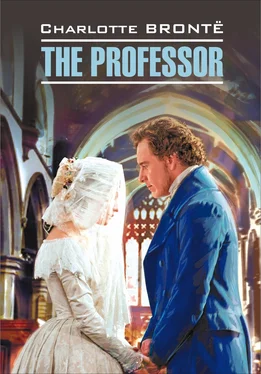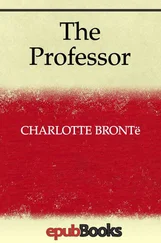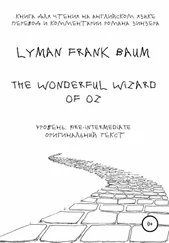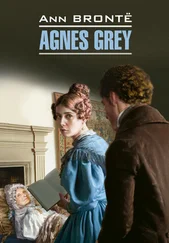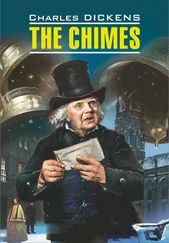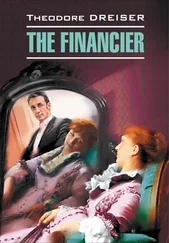“You owe me a debt of gratitude,” were his first words.
“Do I?” said I; “I hope it is not a large one, for I am much too poor to charge myself with heavy liabilities of any kind.”
“Then declare yourself bankrupt at once, for this liability is a ton weight at least. When I came in I found your fire out, and I had it lit again, and made that sulky drab of a servant stay and blow at it with the bellows till it had burnt up properly; now, say ‘thank you!’”
“Not till I have had something to eat; I can thank nobody while I am so famished.”
I rang the bell and ordered tea and some cold meat.
“Cold meat!” exclaimed Hunsden, as the servant closed the door, “what a glutton you are; man! Meat with tea! you’ll die of eating too much.”
“No, Mr. Hunsden, I shall not.” I felt a necessity for contradicting him; I was irritated with hunger, and irritated at seeing him there, and irritated at the continued roughness of his manner.
“It is over-eating that makes you so ill-tempered,” said he.
“How do you know?” I demanded. “It is like you to give a pragmatical opinion without being acquainted with any of the circumstances of the case; I have had no dinner.”
What I said was petulant and snappish enough, and Hunsden only replied by looking in my face and laughing.
“Poor thing! [79] Poor thing! – ( разг. ) Бедолага!
” he whined, after a pause. “It has had no dinner, has it? What! I suppose its master would not let it come home. Did Crimsworth order you to fast by way of punishment [80] order you to fast by way of punishment – ( разг. ) в наказание вас заставили поститься
, William!”
“No, Mr. Hunsden.” Fortunately at this sulky juncture, tea was brought in, and I fell to upon some bread and butter and cold beef directly. Having cleared a plateful, I became so far humanized as to intimate to Mr. Hunsden that he need not sit there staring, but might come to the table and do as I did, if he liked.
“But I don’t like in the least,” said he, and therewith he summoned the servant by a fresh pull of the bell-rope, and intimated a desire to have a glass of toast-and-water. “And some more coal,” he added; “Mr. Crimsworth shall keep a good fire while I stay.”
His orders being executed, he wheeled his chair round to the table, so as to be opposite me.
“Well,” he proceeded. “You are out of work, I suppose.”
“Yes,” said I; and not disposed to show the satisfaction I felt on this point, I, yielding to the whim of the moment, took up the subject as though I considered myself aggrieved rather than benefited by what had been done. “Yes – thanks to you, I am. Crimsworth turned me off at a minute’s notice [81] turned me off at a minute’s notice – ( разг. ) вмиг вышвырнул меня с работы
, owing to some interference of yours at a public meeting, I understand.”
“Ah! what! he mentioned that? He observed me signalling the lads, did he? What had he to say about his friend Hunsden – anything sweet?”
“He called you a treacherous villain.”
“Oh, he hardly knows me yet! I’m one of those shy people who don’t come out all at once, and he is only just beginning to make my acquaintance, but he’ll find I’ve some good qualities – excellent ones! The Hunsdens were always unrivalled at tracking a rascal; a downright, dis-honourable villain is their natural prey – they could not keep off him wherever they met him; you used the word pragmatical just now – that word is the property of our family; it has been applied to us from generation to generation; we have fine noses for abuses; we scent a scoundrel a mile off; we are reformers born, radical reformers; and it was impossible for me to live in the same town with Crimsworth, to come into weekly contact with him, to witness some of his conduct to you (for whom personally I care nothing; I only consider the brutal injustice with which he violated your natural claim to equality) – I say it was impossible for me to be thus situated and not feel the angel or the demon of my race at work within me. I followed my instinct, opposed a tyrant, and broke a chain.”
Now this speech interested me much, both because it brought out Hunsden’s character, and because it explained his motives; it interested me so much that I forgot to reply to it, and sat silent, pondering over a throng of ideas it had suggested.
“Are you grateful to me?” he asked, presently.
In fact I was grateful, or almost so, and I believe I half-liked him at the moment, notwithstanding his proviso [82] proviso – ( лат. ) условие, оговорка
that what he had done was not out of regard for me. But human nature is perverse. Impossible to answer his blunt question in the affirmative, so I disclaimed all tendency to gratitude, and advised him if he expected any reward for his championship, to look for it in a better world, as he was not likely to meet with it here. In reply he termed me “a dry-hearted aristocratic scamp,” whereupon I again charged him with having taken the bread out of my mouth.
“Your bread was dirty, man!” cried Hunsden – “dirty and unwholesome! It came through the hands of a tyrant, for I tell you Crimsworth is a tyrant, – a tyrant to his workpeople, a tyrant to his clerks, and will some day be a tyrant to his wife.”
“Nonsense! bread is bread, and a salary is a salary. I’ve lost mine, and through your means [83] through your means – ( разг. ) с вашей помощью
.”
“There’s sense in what you say, after all,” rejoined Hunsden. “I must say I am rather agreeably surprised to hear you make so practical an observation as that last. I had imagined now, from my previous observation of your character, that the sentimental delight you would have taken in your newly regained liberty would, for a while at least, have effaced all ideas of forethought and prudence. I think better of you for looking steadily to the needful.”
“Looking steadily to the needful! How can I do otherwise? I must live, and to live I must have what you call ‘the needful,’ which I can only get by working. I repeat it, you have taken my work from me.”
“What do you mean to do?” pursued Hunsden coolly. “You have influential relations; I suppose they’ll soon provide you with another place.”
“Influential relations? Who? I should like to know their names.”
“The Seacombes.”
“Stuff! I have cut them. [84] I have cut them. – ( разг. ) Я порвал с ним отношения.
”
Hunsden looked at me incredulously. “I have,” said I, “and that definitively.”
“You must mean they have cut you, William.”
“As you please. They offered me their patronage on condition of my entering the Church [85] on condition of my entering the Church – ( разг. ) при условии, что я приму духовный сан
; I declined both the terms and the recompence; I withdrew from my cold uncles, and preferred throwing myself into my elder brother’s arms, from whose affectionate embrace I am now torn by the cruel intermeddling of a stranger – of yourself, in short.”
I could not repress a half-smile as I said this; a similar demi-manifestation of feeling appeared at the same moment on Hunsden’s lips.
“Oh, I see!” said he, looking into my eyes, and it was evident he did see right down into my heart. Having sat a minute or two with his chin resting on his hand, diligently occupied in the continued perusal of my countenance, he went on:
“Seriously, have you then nothing to expect from the Seacombes?”
Читать дальше
